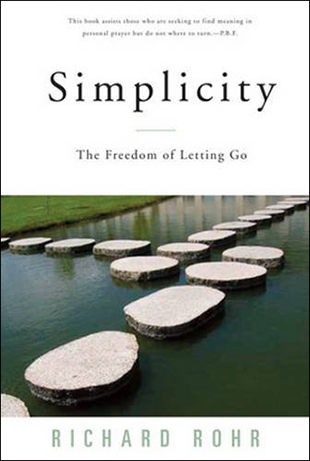"One of the hardest things to do in letting go is giving up the need to be something. The more positive our self-image, the more dangerous it is. The more pious it is, the more dangerous it is. And the most dangerous thing of all is to be a professional Christian. That's why it's always the Pharisees and scribes who kill Jesus, because they have to defend their theology — and in this theology there's no place for the reality of an incarnate Christ. If we're honest, we probably find it a bit disappointing that Jesus Christ came as a completely normal human being.
"Letting go of the present means giving up our self-image, our titles, our public image. I think this is one of the many meanings of the First Commandment: 'You shall have no other gods before me.' What's at stake here are not just false images of God (which mostly serve our purposes), but also comfortable images of ourselves. That's probably what the saints meant when they said: We have to move to the place of faith, to the place of self-forgetfulness, of nothingness.
"When C.G. Jung was an old man, one of his disciples read John Bunyan's Pilgirm's Progress; and he asked Jung, 'What has your pilgrimage really been?' And Jung answered: 'My journey consisted in climbing down ten thousand ladders so that now at the end of my life I can extend the hand of friendship to this little clod of earth that I am.' That's a free man. The word 'human' comes from the Latin humus, which means earth. Being human means acknowledging that we're made from the earth and will return to the earth. For a few years we dance around on the stage of life and have the chance to reflect a bit of God's glory. We are earth that has come to consciousness. If we discover this power in ourselves and know that we are God's creatures, that we come from God and return to God, that's enough. You can't grasp this with logic; even this sermon won't convince anyone that this is how it is. You have to experience it yourself, by going on the journey yourself and walking the path yourself. That's why we call our center in New Mexico the Center for Action and Contemplation, because only when we come to the contemplative vision within do we find the real basis of the Gospel.
"This is exactly what Jesus does in the forty days in the wilderness: He goes to a place of emptiness. And it says: He fasted for forty days, meaning, he made himself empty. He stared down the demon who told him, 'You have to be successful.' And he answered, 'No, I don’t' need that.' When he stood on the pinnacle of the temple, he stared down the second who told him, 'You have to be on the right religious track.' And Jesus said: 'Get lost. I don't need this game.' Finally he met the demon who told him, 'You can do the will of God with the tools of power.' But the price of power is falling down before Satan.
"We all have to start from the assumption that our path too leads into the wilderness and that we have to look exactly the same three demons in the eye: the need to be successful, the need to be righteous or religious, and the need to have power and get everything under control. Until we have stared down these three demons within us, there is no possibility of getting out of the wilderness and proclaiming the Kingdom of God. Otherwise we'll always be proclaiming our own kingdom. We use the Gospel to enthrone ourselves, and then the inner and outer ways split apart. God calls all of you to take the path of the inner truth — and that means taking responsibility for everything that's in you: for what pleases you and for what you're ashamed of, for the rich person inside you and for the poor one. Francis of Assisi called this, 'loving the leper within us.' If you love the poor one within you, you'll discover that you have compassion 'outside' too, that there's room in you for others, for those who are different from you, for the least among your brothers and sisters.
"Less really is more. Only those who have nothing to prove and nothing to protect, those who have in them a broad space big enough to embrace every part of their part of their own soul, can receive the Christ. And Christ himself will lead us on this path."
